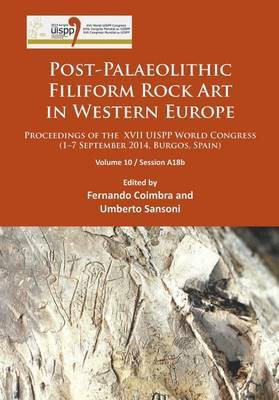Post-Palaeolithic Filiform Rock Art in Western Europe(English, Paperback, unknown)
Quick Overview
Product Price Comparison
Filiform rock art appears as a spontaneous technique, more simple and immediate than pecking, good either for autonomous strands of expression, or for sketches and first drafts regarding works of painting or pecking. According to the order of presentation of the session's papers during the XVII IUPPS (UISPP) Conference in Burgos, the articles published here are the following: Late prehistoric incised rock art in southern Europe: a contribution for its typology, by Fernando A. Coimbra, where the author presents a preliminary typology of this kind of rock art, divided in two groups (geometric and figurative), approaching not only common themes to several countries, but also some examples that have only a regional character; Filiform rock art in mount Bego (Tende, Maritime Alps, France), by Nicoletta Bianchi, which analyses some cases where pecked carvings overlap filiforms, therefore pre-dating pecked engravings and studies the interaction of the two carvings tradition; Filiform figures in the rock art of Valcamonica from Prehistory to the Roman age, by Umberto Sansoni, Cinzia Bettineschi and Silvana Gavaldo, that provides a general corpus of the figurative incised rock art of Valcamonica with a quantitative and qualitative approach, by considering the typological variety, the long-lasting chronological dating and the strong relation with the local pecked rock art of the Camunian filiforms; Threadlike engravings of historical period on the rocks and plaster of churches and civic buildings. Some comparisons and proposals of interpretation, by Federico Troletti, which presents the incised engravings exclusively of historical time located in some sites of Valcamonica - the area of Campanine di Cimbergo and Monticolo di Darfo; The rock art from Figueiredo (Serta, Portugal): typology, parallels and chronology, by Fernando A. Coimbra and Sara Garces, focusing vi on the description of the engravings from three carved rocks with incised motives from the place of Figueiredo, in central Portugal, which were studied during different fieldworks. Two other papers of researchers that couldn't attend the Conference were also presented: The filiform rock art from Kosovo, by Shemsi Krasniqi, which presents recent findings from Kosovo with a similar typology of figures from other European countries; The filiform rock engravings of the Parete Manzi of Montelapiano (Chieti, Italy), by Tomaso Di Fraia, which analyses the problematic of incised rock art from a rock shelter in the centre of Italy.


